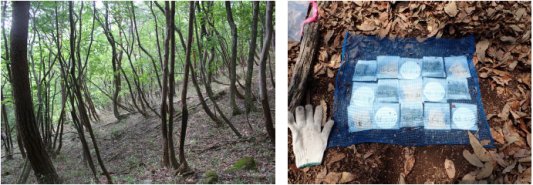聴講希望の方は、ご所属、お名前、連絡先等記してメールにてお問い合わせください。
オープンセミナー事務局: rish-center_events@rish.kyoto-u.ac.jp
要旨
There is a wide consensus that forests are key in climate change mitigation, but we still have much to learn about how plant-microbial-soil interactions contribute to self-sustainability of forest ecosystems. In this talk, I will outline what we know about decomposition of dead leaves by microbes that is crucial for understanding of the self-sustainability of forest. I will highlight my work on Mt. Oe in Northern Kyoto, where natural ecosystems established on the rock that contains high concentrations of heavy metals such as nickel provide a perfect opportunity to investigate how leaf decomposition interacts with various environmental stresses (heavy metal toxicity, poor nutrient condition and low water availability in the soil). Here, I will report that slow decomposition of dead leaves from trees could delay cycling of nutrients in the ecosystem established on the rock with high concentrations of heavy metals, but trees are able to manage their lives in such a harsh environment in a manner that differs by species. The knowledge we gain from Mt. Oe could also be used for phytoremediation technologies to collect hazardous substance in the contaminated soil.
 Fig. 1 Photos from fieldwork on Mt. Oe, Kyoto. Forest ecosystem established on serpentine rock that is characterized by small trees owing to severe environmental stress (left). Decomposition experiment with various substrates (green tea, cellulose filter, coffee filter) to investigate the ability of microbes to decompose organic matter (right).
Fig. 1 Photos from fieldwork on Mt. Oe, Kyoto. Forest ecosystem established on serpentine rock that is characterized by small trees owing to severe environmental stress (left). Decomposition experiment with various substrates (green tea, cellulose filter, coffee filter) to investigate the ability of microbes to decompose organic matter (right).
印刷用PDFファイル(318 046 バイト) | ページ先頭へもどる
2020年7月15日作成


